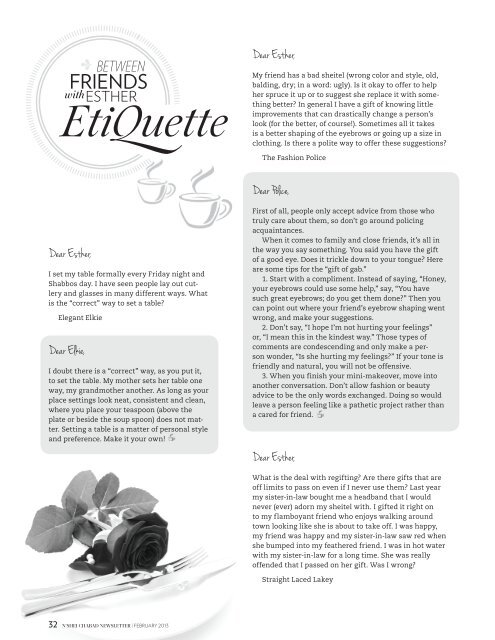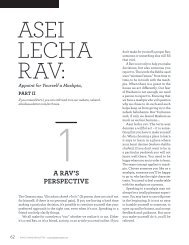Esther E 32-33
You also want an ePaper? Increase the reach of your titles
YUMPU automatically turns print PDFs into web optimized ePapers that Google loves.
BETWEEN<br />
FRIENDS<br />
withESTHER<br />
EtiQuette<br />
Dear <strong>Esther</strong>,<br />
My friend has a bad sheitel (wrong color and style, old,<br />
balding, dry; in a word: ugly). Is it okay to offer to help<br />
her spruce it up or to suggest she replace it with something<br />
better? In general I have a gift of knowing little<br />
improvements that can drastically change a person’s<br />
look (for the better, of course!). Sometimes all it takes<br />
is a better shaping of the eyebrows or going up a size in<br />
clothing. Is there a polite way to offer these suggestions?<br />
The Fashion Police<br />
Dear Police,<br />
Dear <strong>Esther</strong>,<br />
I set my table formally every Friday night and<br />
Shabbos day. I have seen people lay out cutlery<br />
and glasses in many different ways. What<br />
is the “correct” way to set a table?<br />
Elegant Elkie<br />
Dear Elkie,<br />
I doubt there is a “correct” way, as you put it,<br />
to set the table. My mother sets her table one<br />
way, my grandmother another. As long as your<br />
place settings look neat, consistent and clean,<br />
where you place your teaspoon (above the<br />
plate or beside the soup spoon) does not matter.<br />
Setting a table is a matter of personal style<br />
and preference. Make it your own!<br />
First of all, people only accept advice from those who<br />
truly care about them, so don’t go around policing<br />
acquaintances.<br />
When it comes to family and close friends, it’s all in<br />
the way you say something. You said you have the gift<br />
of a good eye. Does it trickle down to your tongue? Here<br />
are some tips for the “gift of gab.”<br />
1. Start with a compliment. Instead of saying, “Honey,<br />
your eyebrows could use some help,” say, “You have<br />
such great eyebrows; do you get them done?” Then you<br />
can point out where your friend’s eyebrow shaping went<br />
wrong, and make your suggestions.<br />
2. Don’t say, “I hope I’m not hurting your feelings”<br />
or, “I mean this in the kindest way.” Those types of<br />
comments are condescending and only make a person<br />
wonder, “Is she hurting my feelings?” If your tone is<br />
friendly and natural, you will not be offensive.<br />
3. When you finish your mini-makeover, move into<br />
another conversation. Don’t allow fashion or beauty<br />
advice to be the only words exchanged. Doing so would<br />
leave a person feeling like a pathetic project rather than<br />
a cared for friend.<br />
Dear <strong>Esther</strong>,<br />
What is the deal with regifting? Are there gifts that are<br />
off limits to pass on even if I never use them? Last year<br />
my sister-in-law bought me a headband that I would<br />
never (ever) adorn my sheitel with. I gifted it right on<br />
to my flamboyant friend who enjoys walking around<br />
town looking like she is about to take off. I was happy,<br />
my friend was happy and my sister-in-law saw red when<br />
she bumped into my feathered friend. I was in hot water<br />
with my sister-in-law for a long time. She was really<br />
offended that I passed on her gift. Was I wrong?<br />
Straight Laced Lakey<br />
<strong>32</strong> N’SHEI CHABAD NEWSLETTER | FEBRUARY 2013
Dear Lakey,<br />
Regifting is okay to do with impersonal<br />
presents. Let me explain. When<br />
an out-of-town guest comes to stay at<br />
your house and brings you a present,<br />
that present was not picked especially<br />
for YOU. The out-of-town guest<br />
does not know you, and was definitely<br />
not walking up and down the aisles of<br />
Crate and Barrel picking just the bowl<br />
she thought you would like. That bowl<br />
is not a personal gift, it is a courteous<br />
gift and the giver would never know<br />
(or care) if you passed on the bowl for<br />
whatever reason (it is not your taste,<br />
you needed a gift and had no time to go<br />
to the store, etc.). The gift was a thank<br />
you and accomplished the purpose.<br />
However, when someone personally<br />
close to you, like a sister-in-law,<br />
buys you a gift out of affection, the<br />
effort and consideration that goes into<br />
the purchase is half the gift. To pass it<br />
on makes the giver feel like her time,<br />
effort and display of friendship means<br />
little to you. Think about what happens<br />
when your child makes a picture for<br />
you. The picture may be terrible, but<br />
you hang it up because you appreciate<br />
the love that went into it. A gift from<br />
a loved one is similar. To publicly pass<br />
it on is to disregard the love that went<br />
into the purchase.<br />
Dear Harried,<br />
I don’t think you need to educate your guests (at least<br />
not formally), nor ignore the behavior. Try asking your<br />
passive guests specific requests. For example, before<br />
you begin clearing, ask a few guests, “Would you please<br />
help me collect the soup bowls?”<br />
I have a friend who is a pro at this. At the end of the<br />
meal she says to her (regular) guests, “Okay, folks. If<br />
we all pitch in, the cleanup will only take ten minutes.”<br />
Everyone gets to work.<br />
As for the lingerers, stop hinting! Be very direct and<br />
say, “Thank you all so much for coming. I’m exhausted<br />
and going to go to bed now. I know you understand. May<br />
I walk you to the door first?” My father-in-law’s famous<br />
line is, “Please stay as long as you like, but you know<br />
where I’m going!” Most people don’t want to hang out<br />
without the hosts.<br />
Note to all guests:<br />
When you are invited to a meal in someone’s home,<br />
know that your host is spending all day cooking and<br />
preparing for you. It is proper to show appreciation with<br />
a gift. The gift can be small; it is the gesture that is significant.<br />
Some guests call on Friday and ask if there are<br />
any errands needed. At the meal, help out! Stand up and<br />
make yourself useful by serving, clearing, or helping<br />
to prepare the salad. Most hosts do not have a staff of<br />
waiters on hand to wine and dine you, so don’t act like<br />
you’re in a restaurant.<br />
Dear <strong>Esther</strong>,<br />
Living in Crown Heights, we have many opportunities to<br />
host guests for Shabbos and Yom Tov. While I enjoy having<br />
guests, sometimes it bothers me that many guests<br />
don’t offer to help serve or clear the table, let alone bring<br />
a bottle of wine or flowers. I’m not sure how to address<br />
this. Should I just ignore their behavior or try to educate<br />
them on how to show their appreciation?<br />
In addition, I have had several guests who linger for<br />
hours after the meals and get insulted when I give hints<br />
that it’s time to go home. Even if I say I’m tired and<br />
bring them their coats they won’t budge. What is the<br />
polite way to ask guests to leave? I’m hesitant to invite<br />
these guests again because of this issue.<br />
A Harried Hostess<br />
FEBRUARY 2013 | N’SHEI CHABAD NEWSLETTER <strong>33</strong>


















